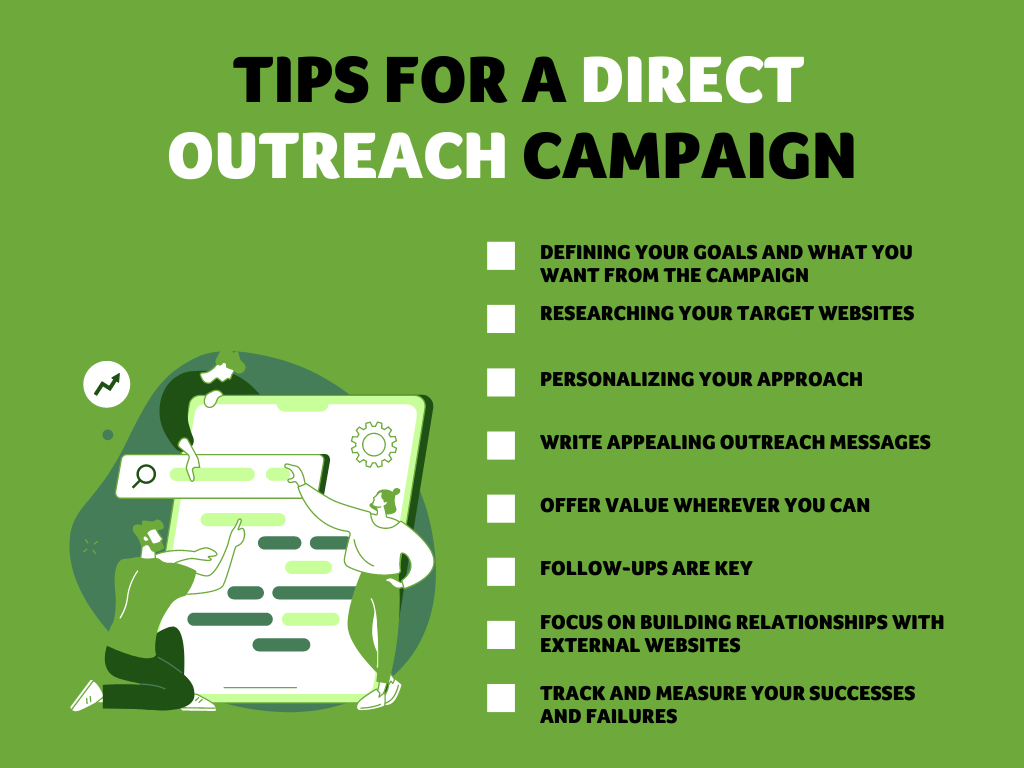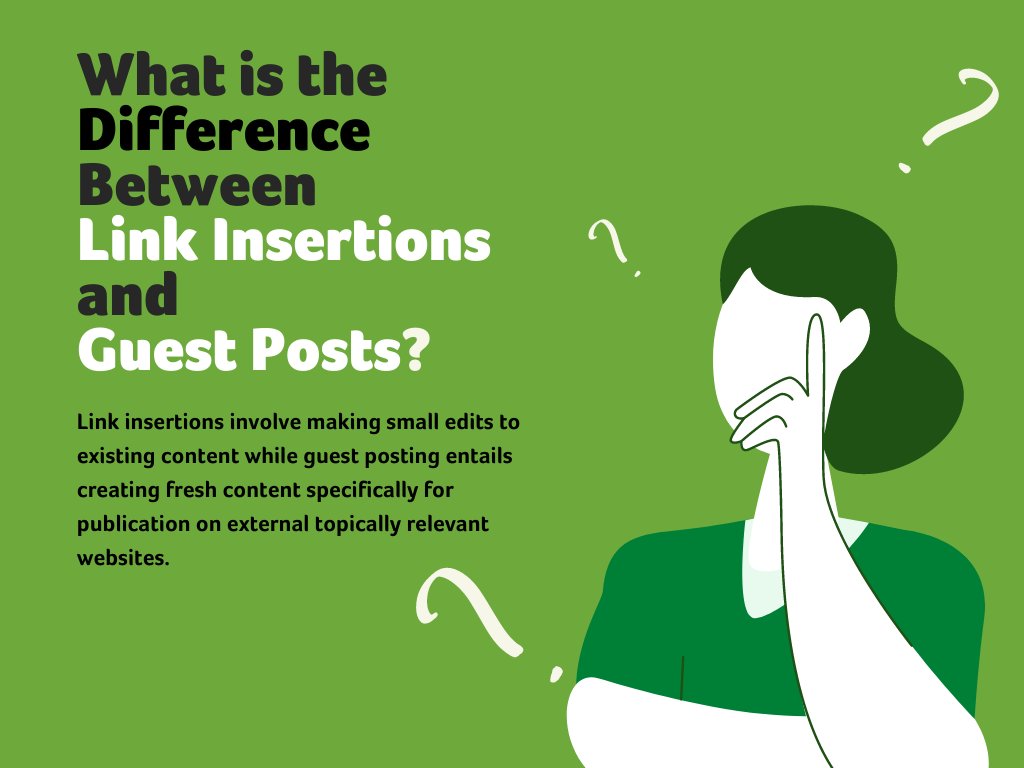Link insertions play a vital role in sustaining a strong search engine optimization (SEO) foundation for success, as they serve as a strategic approach to boosting your website’s organic traffic, visibility, and authority.
In fact, a recent study suggests that 53% of marketers feel that link-building will maintain its influence on search engine rankings in the future. The value of link insertions, backlinks, and other link-building strategies is highlighted by the fact that only a mere 2.2% of all online content generates multiple unique backlinks. These findings emphasize the importance of implementing effective link-building techniques to enhance your SEO.
In this article we will dive deep and discover what link insertions are, what they mean for link-building, and some of the best strategies to implement them correctly, are you ready to learn?
Keep reading!
What Are Link Insertions?
Link insertions are just another aspect of link building and link building is just a process that guarantees a placement of a link into a pre-existing piece of content on a relevant website. This process is commonly referred to as direct outreach and it involves reaching out to a website owner for a considered backlink opportunity.

Some tips for a direct outreach campaign include:
-
Defining your goals and what you want from the campaign.
-
Researching your target websites.
-
Personalizing your approach. Nothing is worse than reading a copy/paste email.
-
Write appealing outreach messages that clearly state your goal while remaining unique and friendly.
-
Offer value wherever you can.
-
Follow-ups are key.
-
Focus on building relationships with external websites rather than simply networking.
-
Track and measure your successes and failures. What works and what doesn’t?
Through established connections and requesting the inclusion of a link, website or business owners aim to enhance their website’s visibility and authority on search engine results pages (SERPs). Therefore, link insertions are seen as a very reliable and useful tactic within the larger framework of link building.
By leveraging the credibility and traffic of the host website, link insertions enable the linked website to expand its online presence significantly. It is a valuable strategy that is generally used in off-page SEO.
Actually, let’s dig a bit deeper:
Link insertions in link building
To start with, there is a method to the madness! The purpose behind link-building strategies varies from adhering to SEO best practices to improving the overall user experience of any given website.
With that said, link insertions are vital to SEO success and domain authority.
Here’s why:
It drives organic traffic from search engines, and this is even more common in competitive industries. Link building can be super-efficient when combined with strong technical SEO foundations, on-page SEO, and high-quality content.
In fact, the need for relevant, authentic, and just overall good content has never been more important in this digital era. To further the point, over half (65%) of marketers believe that the most difficult but rewarding aspect of SEO is link building and 93.8% of link builders say that link quality is more important than quantity.
To sum it up, it is strongly advised to avoid spammy links while links originating from highly relevant and authoritative websites are considered valuable.
What are paid link insertions?
Paid link insertions happen when a website gives money to a third-party domain to obtain a followed backlink that directs visitors or an audience to their own domain.
While link building as mentioned is absolutely vital, it’s important to understand that purchasing links (the wrong way) is explicitly prohibited by search engines and Google’s Guidelines. In fact, partaking in other black-hat link-building strategies can result in severe penalties and may even impact your domain rating.
Instead of “buying” backlinks, it’s best to pay an SEO expert or hire an SEO Service such as ABC Plus to help your website earn backlinks from the right websites using direct outreach rather than waste time, money, and effort.
What is the Difference Between Link Insertions and Guest Posts?

They are both backlinks, so what’s the difference? Link insertions and guest posting are two fairly distinctive methods that are commonly used in the realm of link building. Both of these strategies contribute to this broader objective but both are very different.
Link insertions involve making small edits to existing content while guest posting entails creating fresh content specifically for publication on external topically relevant websites.
Let me be clear, the main goal here for both strategies is to earn backlinks for your website. Which are external links that point back to a target website. These backlinks act as signals to search engines and these signals tell web crawlers that your website has credibility. If your website is relevant enough, it will send its viewers to your site for the information they need.
In contrast, guest posts involve writing and publishing content as guest authors on external websites. However, unlike link insertions, guest posting is focused on creating valuable content and building strong relationships with online
audiences.
The main purpose for creating guest posts is to provide informative and engaging content to the target website’s viewers while also generating exposure and hopefully gaining valuable backlinks.
Tips for finding guest posting opportunities:

Here are some tips for finding guest post opportunities:
-
Google is your friend: Use Google to find guest posting opportunities on relevant websites. It can’t hurt to reach out to website owners and try to network for guest post opportunities.
-
Research: Research other guest authors on relevant websites and try and discover what topics are popular within your niche.
-
Social Media Networking: Use social media platforms to find guest blogging opportunities.
-
Actively Seek Opportunities: Don’t quit! Proactively reach out to relevant websites or a popular blog of your choice on a regular basis.
-
Understand the Blog’s Content: Familiarize yourself with the target blog’s writing style and focus on its content. If you don’t know anything about the website, then how are you going to connect with its audience?
With all that said, let’s jump into how link insertion strategies work and how to use them effectively:
The Strategy and How It Works
While SEO is an ever-evolving field that changes frequently, it’s important to have a basic content marketing strategy set in place. This strategy often includes link-building among other SEO basics.
These basic strategies include:
-
Creating long-form content: longer articles get 77.2% more backlinks than short articles.
-
Creating engaging content such as Listicles: listicles or list articles have an average of 6.19 referring domains which is the highest among all the other content formats.
-
Create engaging and fun infographics and other visuals: posts with images have a 650% higher engagement rate.
While the best plans for link insertion strategies may vary depending on needs and goals, the best strategies include the following:
-
Broken Link Building: broken link building is a strategy where you go and find broken links on other websites and reach out to the site owners to suggest replacing those broken links with relevant links to your own content.
-
The Skyscraper Technique: this includes finding hot topics in your niche and writing great content on it that is better in every way than your competitors.
-
Influencer Collaboration: finding other bloggers, websites, or social media influencers to mention your business or brand can make a world of difference.
-
Resource Link Building: resource link building is solely based on creating valuable and informative resources for your readers. This includes how-to guides, tutorials, infographics, or tools, that other websites would find useful for their audience.
-
Case studies: case studies involve using in-depth data and providing resources to readers that might find those case studies helpful or useful in some way. They are usually informative and easily sharable.

Now that you know what to do, let me tell you how it works:
Why link-insertions work
Link insertions work and are an effective strategy for digital marketers and business owners alike. In the world of SEO, their ability to produce beneficial outcomes is super valuable. One key reason why they work is their potential to enhance website visibility.
By placing links strategically within existing content on external websites, link insertions are able to tap into an already existing audience, and therefore traffic from those websites exposes your brand to a larger viewership. These backlinks from other high-quality websites help establish your website’s credibility in the eyes of Google and other search engines which has a positive impact on your search engine rankings.
As a quick reminder, it’s important to keep in mind that Google considers over 200 ranking factors when determining website positioning.
While factors such as link-juice, hyper-relevant backlinks, and other SEO best practices play an important role, it’s important to recognize that there are numerous other factors that contribute to a website not reaching the number one position on Google’s search engine results pages.
Actually, let me show you some examples to prove the claim:
Some examples of link insertions
Imagine a scenario where a blog post or article briefly mentions the importance of optimizing meta descriptions for a better chance to rank higher but lacks specific guidance on how to do so. This would present a great opportunity to include a link insertion that directs your viewership to a better resource that provides more in-depth information on crafting effective meta descriptions.
By incorporating this type of link insertion, the SEO of the webpage is improved as it offers valuable insights to the reader, going above and beyond. This not only helps improve overall SEO performance but also enhances website visibility and attracts more organic traffic from search engines.

Here are the different types of link insertions:
-
Contextual link insertions: are simply clickable text that is usually a keyword found in relevant content pieces. They are sometimes categorized as either natural or artificial. If they are considered natural, they link to another website on purpose.
-
Citation link insertions: a citation link insertion refers to a direct online mention of your business’s name, address, and phone number.
-
Product or service mention link insertions: these types of links are often associated with brand links. They are exactly what they sound like, links that are associated with a product or service.
-
Brand or Author bio link insertions: essentially, these are links when a brand gets mentioned randomly or is discussed online with or without an accompanying hyperlink.
-
Resource link insertions: are links that are specifically placed to be a direct resource for a targeted audience.
-
Internal link insertions: backlinks are links that send people directly to your website using an external link, internal links are used to connect to other pages or content within the same website. Internal links provide link juice to pieces of content and allow website authority to trickle down the streamline.
Let’s hop into some important factors to consider when designing your outreach campaign:
Important Factors to Consider When Searching for Quality Link Insertions
When searching for those high-quality backlinks, there are some important factors to consider before going that mile and jumping in. You want to make sure that the links you collect are valuable, trustworthy, and aligned with your website’s niche.
Here are key factors to consider:
-
Relevance: You want to find links that are relevant. For example, if you’re a dog groomer, you may search for backlinks from dog food websites, etc.
-
Authority and Trust: To avoid spammy backlinks, it’s best to research and look for websites with a solid online reputation that will enhance your website’s credibility.
-
Organic placement (keeping it all natural!): Aim for natural placement. Use keywords naturally and in a conversational way.
-
Link insertion diversity: Having many backlinks from one domain is okay, but having a large pool of different backlinks from different high-authority websites will largely help you rank higher.
-
Traffic and engagement: Always consider traffic, how many people will be seeing your backlink? Is it worth it?
-
Keeping it ethical: Avoid black-hat strategies and try and stay ethical when collecting backlinks.
-
Tracking your metrics: Create a tracking system for your link insertions, that way you can track what is broken, doing well, or causing harm.
Getting Anchor Texts Just Right
Let me take the time to quickly explain what anchor text is and why getting it right is important for your link insertions.
Anchor text is the clickable text that you find within a hyperlink. It provides information and context about the linked page. To be able to use anchor text effectively, you need to write descriptive and relevant text that represents your linked page content.
For example, a blog content post that is doing well titled, “Best Shoes for Women in 2023” would do well with a link insertion to a product page of women’s shoes. Keep it relevant but avoid using excessive or generic phrases.
Write anchor text in a natural and readable way. Use it for internal linking within your own website to improve navigation for readers and guide users to important related content. When linking to external websites, use anchor text to indicate the topic of the linked page. Avoid over-optimization such as keyword stuffing and consider mobile users by ensuring the visible portion of the anchor text.
Wrapping it Up
Link insertions play a significant role in any effective SEO strategy. They are the deliberate placement of relevant and high-quality links within your already existing content on external websites.
They can improve your visibility, authority, and organic rankings. Use them to increase your referral and organic traffic, gain an advantage on your online reputation, and attract a boarder audience.
But, you don’t have to do it alone! Schedule a call today, we got you!
The post What are Link Insertions? (And how to implement them into your SEO strategy!) first appeared on Authority Builders.